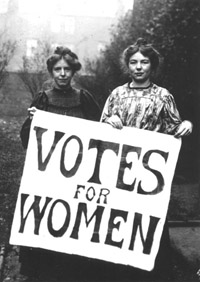News
Census money machine rolls out early

The women in this photograph may will be missing from the 1911 Census, as the Suffragette movement organised a 'No vote, no census' boycott. ©The National Archives.
A press release from findmypast.com says 'Public demand for the 1911 census, which will be a key resource for family historians, has resulted in the records being released earlier than the scheduled 2012 date'. Not quite, as 'certain sensitive information' is, understandably, being held back until the first working day of 2012. Some of the Enumerators’ Summary books are missing for locations in a number of counties, as are the names of thousands of women, who supported a campaign by the suffragette movement for a mass boycott of the census. A section of the 1911 Census website (www.1911census.co.uk) lists and explains why some information is missing.
Whilst many will welcome the opportunity to access the census information early, it does come at a cost to those who want to view original 1911 pages online. Users have to buy 'credits' and you need 30 credits, which cost £2.50 to £3.48, depending on the package of credits that you buy. 'For this price you will also be able to view all the associated images for the family: this includes both sides of the household form (RG 14); the page from the enumerator’s book,which lists the head of household for all the neighbouring buildings; summary statistical pages for the registration district and details of the enumerator’s walk (RG 78). For most searches this means that you will get at between two and seven images for your 30 credits' to quote the 1911 Census website. On the plus side, the images have all been scanned in very high quality colour — all previous censuses have only been available in black and white — giving much clearer images and greater legibility than previous censuses.
Searching the web for early reactions to the release of the 1911 Census, you can find complaints about the cost (although where other viewers can respond to such comments, most of the replies defend the charges) and that the 1921 census might not be released early. Charging does penalise local and social historians, who will want to use census information differently to family historians. Like it or not, this is a commercial exercise driven by a desire to make money, with thousands, if not millions, able and willing to buy the 'credits', so they can search the census online. If this release is successful and makes a lot of money for findmypast.com and The National Archives, they will find it difficult to resist demands to release the 1921 census as soon as they can. What's the point of owning a cash cow if you don't milk it?
16 February 2009
